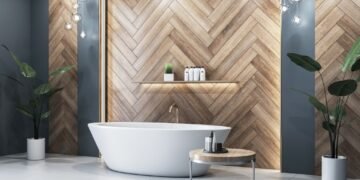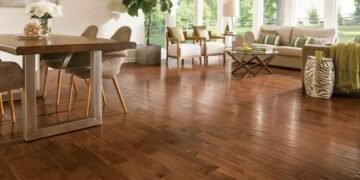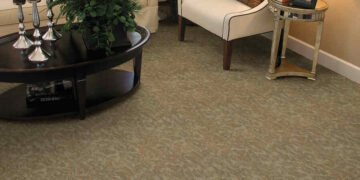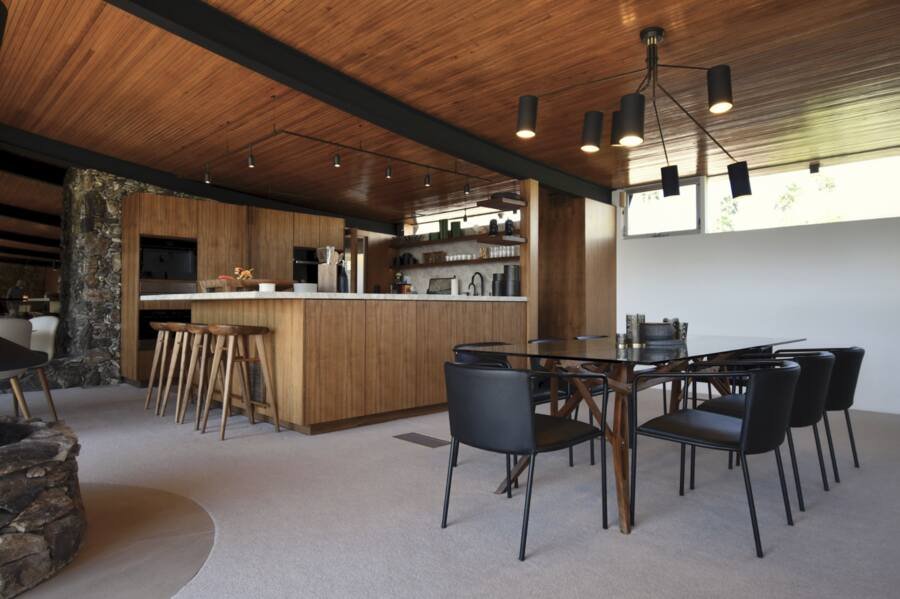Resin flooring is a popular option for industrial and commercial environments because of its hard wearing and durable finish. It is also becoming increasingly popular in residential homes for the same reasons and because of its aesthetic and customisable design options by companies like Trusty Tread. But what is resin flooring? And why is it such a good flooring choice for so many applications? Let’s take a look.
What is Resin Flooring Made From?
There are a few different types of resin floor materials but all of them share some commonalities. With all of them, liquid synthetic resin is mixed with a separate hardener. This triggers a chemical reaction that hardens the resin into an extremely tough yet flexible cross-linked polymer plastic.
The resin is poured onto a concrete substrate. So it is more of a resin coating rather than a full flooring system. But it does more than just add a decorative layer to the concrete. It adds a wide range of practical advantages and can support and protect the concrete beneath.
Different Types of Resin Flooring
There are three main types of resin flooring: epoxy resin flooring, polyurethane flooring, and poly methyl methacrylate flooring. They each have their own specific advantages that are suited to different environments.
Epoxy Resin Flooring
Epoxy flooring is the most used type of resin flooring. Epoxy resin floors are highly durable and cure very hard. The epoxy resin bonds fully to its concrete floor substrate and it is resistant to shocks and impacts as well as abrasion resistant to wear and tear.
Polyurethane Resin Flooring
Polyurethane flooring is most often seen in places like industrial kitchens and breweries. This is because it is very resistant to high temperatures so can withstand the heat from ovens and other cooking equipment.
Polymethyl Methacrylate Flooring
A PMMA, also known as acrylic glass, resin flooring system cures extremely fast. This makes it a good option for industrial spaces that aren’t able to down tools for long. It will also cure at low temperatures, even below freezing.
Additives
The most simple type of resin flooring will consist of just resin and hardeners but this isn’t the only option. Several additives can modify the performance of resin flooring to better suit the property’s needs.
For example, the addition of an aggregate layer will provide the resin flooring with anti-skid properties. Adding decorative finishes using colour pigments and/or decorative flakes can make the final look highly customisable. The colour of epoxy flooring can be distorted by direct sunlight so a UV-resistant seal coat is a popular addition.
Benefits of Resin Flooring
Resin flooring solutions provide a wide range of benefits that can quickly make it the flooring of choice for so many different types of spaces.
Durability
Perhaps one of the biggest benefits that resin floors offer is their remarkably high levels of durability. Resin flooring systems are both hard and flexible. A thick enough resin flooring system, for example, will have a higher compression strength than concrete. This means that it has a greater ability to withstand impacts and take the weight of heavy vehicles or machinery.
As well as its strength, a resin floor will also offer a protective layer that is:
- water resistant
- oil resistant
- chemical resistant
- heat resistant
This makes it ideal for a variety of precise industrial needs.
Resin flooring is also abrasion resistant. So it is unlikely to scratch and it is also resistant to the wear and tear associated with heavy foot traffic or vehicle use. So it is perfect for retail spaces and automotive factories alike.
Hygiene properties
For commercial kitchens and other spaces where hygiene is of the utmost importance, resin floorings can be an ideal solution. Resin’s hygiene benefits are due to a few factors. First, it will not absorb any spillages, dirt, or grime. This results in easy cleaning that can remove all traces of contamination. And because it can be fully flooded without distorting the surface, highly effective cleaning methods can be used.
It is also a completely seamless surface. This is vitally important for hygiene because it means that contaminants can’t get stuck in any seams.
Longevity
Resin flooring is a long-lasting flooring solution. You can expect a properly installed resin floor to last upwards of ten years and sometimes into multiple decades.
Cost-effective solution
Partially due to their longevity but also due to the low cost of materials, resin floors are a cost-effective choice. While resin flooring installation can be expensive because of the skill and experience needed, because it needs to be replaced far less often than other flooring surfaces, it can often work out cheaper in the long run.
Attractiveness
The look of resin flooring is highly customisable. Any colour choice is available and decorative flakes can be added as well as a variety of finishes from high gloss to matte.
Comfort underfoot
Unlike a concrete surface, for example, that can be quite unforgiving underfoot, resin flooring is comfortable to walk on. This makes it perfect for places where there will be a lot of foot traffic or where employees will be working on their feet for long periods.
Low maintenance
Resin flooring requires very little maintenance beyond simple cleaning methods. This means that it is easy to keep clean and safe and also means that it can be a helpful addition to a space that will get dirty easily.
Hypoallergenic
Resin floors are hypoallergenic. This makes it a good choice for allergy sufferers as it makes it easier to control the environment and rid it of allergens.
Compatibility with underfloor heating
Resin flooring works extremely well with underfloor heating because of its high heat conductivity, comfort underfoot, and durability.
The Bottom Line
Residential, commercial, and industrial resin flooring is growing ever more popular. This is because resin floors provide a wide range of benefits that are difficult to find in any other single flooring type. Resin floors are created through the chemical reaction of synthetic resin and hardeners and it is this reaction that creates the unique durable, long-lasting, attractive, comfortable, and low-maintenance flooring surface that works so well for so many different spaces.
Recommended Posts:
















